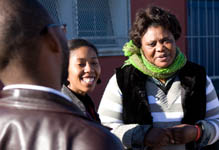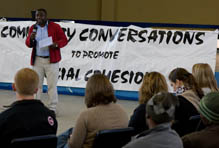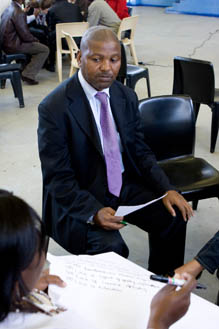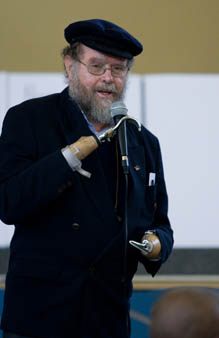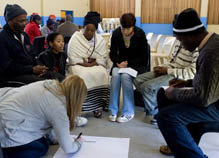
Community members discuss a way forward at the Social Cohesion dialogue in Khayelitsha
July 20, 2009 – On the first Mandela Day, July 18, 2009, the community of Khayelitsha in Cape Town convened its second community conversation on social cohesion. About 25 people attended the event.They honoured the meaning of Mandela Day by discussing important social issues such as xenophobia and trying to come up with solutions
The dialogue was a follow-up to a community conversation held in Khayelitsha on May 16, 2009.
Zoe Nkonjolo of Africa Unite, an organisation which works with the Nelson Mandela Foundation to facilitate these conversations, said: “The issue on the table was how the community of Khayelitsha could come together to build relationships and live with each other.”
The common perspective presented was that “There should be no discrimination of any kind, as set out in South Africa’s Constitution,” said Nkonjolo.
These are just some of the key points that the community raised at the first meeting:
- There needs to be an understanding of why and how there came to be foreigners in the Khayelitsha community
- The refugees and foreigners in Khayelitsha have both positive and negative impacts on the community, for example they bring new business and development to the community, but they also present competition for jobs
- There are many African and international foreigners in South Africa, but why is it that the problem is with the black, African foreigners? Hence the term Afrophobia was coined, meaning Africans against other Africans
- The way the media report on foreigners is a burning issue for the community. It seems that each time a foreigner does something illegal, all foreigners are illegal. This has led to misconceptions about foreigners
- The community feels that the leaders who were in exile, upon returning to their countries, should share their experience of living in a foreign country, especially how they were welcomed and treated
The community agreed at Saturday’s dialogue that:
- Violence does not resolve conflict
- Dialogue is the solution to conflict
- Tolerance is key to accepting other people
- It is important for people to learn to co-exist
- Sharing of skills, job creation and capacity-building are needed
The guest speaker for the day was Father Michael Lapsley, director of the Institute for Healing of Memories.
Lapsley began his talk by saying, “Most people have been speaking of Nelson Mandela with great praise, but some people are saying that he’s not God, he’s not a saint.”
Mr Mandela is a human being, said Lapsley. He is not perfect and he has also made mistakes. “If he was a god or a saint, he wouldn’t be as inspiring to us, as he wouldn’t be like one of us.” Mr Mandela has influence on people because he is also human.
“What is inspiring about Mr Mandela, in my book, is the choices that he made,” Lapsley stated.
“Sixty-seven years ago he was already making choices not only for himself but for other people.”
Lapsley explained that Mr Mandela joined the African National Congress because he wanted freedom, but not just for himself, but for the entire nation.
“If you look at Mr Mandela’s life, what comes to me is that he is someone who is willing to sacrifice for the freedom of others,” said Lapsley, who encouraged all present to follow this example so that they could live together in peace.
Reverend Templeton Mbekwa from the Khayelitsha Crisis Committee, which dealt specifically with the xenophobic attacks, was also present and said, “Today’s dialogue can help communities because our people need more education about our own violence as locals and how to dwell with foreigners and learn their culture and way of doing things.”
Mbekwa emphasised that for domestic, territorial and political violence, solutions can be found.
It is not all bad, as Joan Bakia, a new member of the Khayelitsha community, said. “I have been living in Khayelitsha for a month and the environment is cool, the people are friendly and they look more secure now.”
Reflections
“We have shared, learnt and gone deep into our souls. Some of the experiences were exciting and some were painful, but what has surfaced is that we are all people and fellow human beings.”- Mary Tal from the Whole World Women Association, a member of the facilitating team
“We are happy today because we feel there is an ear that is listening.” - Edmond Tiku, representing the City of Cape Town
“It was the first time I attended something like this and I am blessed to have had the opportunity to learn about Mr Mandela and the reason behind Mandela Day. This day is challenging us to do something. We are now seen as South Africans and not foreigners and it has given me a reason to contribute and not ask what South Africa can offer me but what I can offer to South Africa.” – Joan Bakia, a Khayelitsha community member
“I am glad that we have a mixture of cultures in one room.” – Mandla Nakile, a community worker from Khayelitsha
“I find South Africa has a very strong civil society that cares and it is great to have an event like this to let people vent and create mutual understanding.” – Caitlin Quin from Canada, in South Africa doing her research thesis on xenophobia, based at the Human Rights Commission
“We are learning and sharing ideas and this inspires me to learn more.” – Terish Mpande, a local businessman
